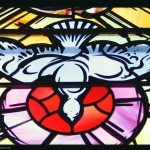The Anchoress wrote last week about her experience of desolation in Penn Station. She was people-watching, a favorite activity, and then everything changed:
I wouldn’t presume to say that anything was being communicated to me, but I nevertheless had a glimpse — or an overwhelming “sense” — of something. In that brief flash I knew that hovering over us, near us, within us, all about us, was an awful, unstoppable ache of love and sadness; a sense of “Oh, my people! How often I have wanted to gather your children together as a hen protects her chicks beneath her wings, but you wouldn’t let me.”
This ache of longing, reaching out; of be-longing unanswered, unfulfilled.
It was a life-changing experience; you’ll want to read the whole thing.
It reminded me of a story of my own: less dramatic, but similar in its way.
It was five or six years ago. I was a new Catholic, and beginning the process of becoming a Lay Dominican. In those days, my wife Jane and I had the habit of visiting a local mall on our date nights. It was a pleasant place to walk, and there was a Borders Books at one end of the mall that we would always visit. Often enough Jane would want to continue browsing after I’d found my book or two or three, and so I’d take my books and go sit in the food court just outside the bookstore, and I’d read, and I’d ponder, and I’d people-watch.
I saw all kinds: teenage boys, laughing, with their hats on backwards and rude T-shirts; young women with oddly colored hair and tattoos; older couples who looked comfortable with each other; younger couples who didn’t. I saw a lot of sour faces, and couples who were clearly Not Happy With Each Other; and I saw a lot of people who just looked tired, all dressed up and nobody happy.
I was reading a lot about St. Dominic and the early Dominicans in those days; and one of the things the early Dominicans would do is take a ladder to the town square, climb up, and begin preaching. They were listened to, and many were saved because of it. And as I sat there, looking around at the others in the food court, I began to get that same sense that the Anchoress did, that here were sheep without a shepherd: that Christ loved them dearly, and wanted to speak to them. Now, that’s what the Dominicans—the Order of Preachers—is for; and I began to wonder, practically speaking, how one would do that.
For most of us, our primary witness is to our immediate neighbors: those we have relationships with, and with whom we interact every day. But Dominicans are called to more than that; we’re called to bring Jesus’ love and his message to the world.
Now clearly I wasn’t going to be mounting a ladder, or a soapbox, and haranguing the crowd in the middle of a mall. I’d be escorted off of the property in five minutes or less, and told not to come back. And even if I wasn’t, it didn’t seem to me that it would do any good: we Americans, we’ve been inoculated by advertising and our political discourse to listen only to those to whom we’re already well-disposed.
For much the same reason, I couldn’t simply walk up to people and start a conversation. The people at the mall aren’t there to talk to me, and they don’t want me to bother them.
So how could I reach these people, the ones I see around me every day, my neighbors, the ones who need Christ so badly?
And as I sat there, I started thinking about about who these people were (which is where I should have started, no doubt). Statistically, many of the people I saw there were Christians, and knew Christ already. Mind you, even committed Christians benefit from good preaching; but not all of them were lost. And so I thought about those who who didn’t know Christ, or had rejected his love. And I thought, many of those have Christians in their lives, who love them and show God’s love to them and pray for them.
And then were those who don’t know any committed Christians, who have no idea that God is a God of love, and who have no one to pray specifically for them. And I thought, “I can do that. I can pray for them.” Not en masse, but individually, as they walked by.
Here they were in front of me, in their numbers. I didn’t know them; as I’d realized, I had no obvious way to meet them. I didn’t know their circumstances, or anything about them. I didn’t know who they were, or whether they knew Christ in any way, or whether there was anyone to pray for them. But I knew that some of them were in each of the categories I’d come up with; and I knew that each and every one of them needed God’s blessing.
God’s blessing is a wonderful thing. God always meets us where we are, and is eager to give us what we truly need. I didn’t know these people or their needs, but God does.
And so I began to pray for them:
“Lord, please bless him and keep him and make your face to shine upon him…and have mercy on me. Lord, please bless her and keep her and make your face to shine upon her…and have mercy on me.” One by one, as they walked by, I prayed for them.
I don’t spend as much time in the mall anymore; Borders is gone, and now I’ve little occasion to sit in food courts. But I still pray this way: when I’m on the freeway and someone cuts me off; as I drive in to work, and see individuals walking to their offices; as I walk through the mall, or down the street, or wherever I happen to be, when someone comes to my attention:
“Lord, please bless him and keep him and make your face to shine upon him…and have mercy on me.”
They will never know (at least, on this side of the grave) that I prayed for them; and I will never know (at least, on this side of the grave) what effect my prayers had. But God is good; and He knows, and He loves, and He blesses.










